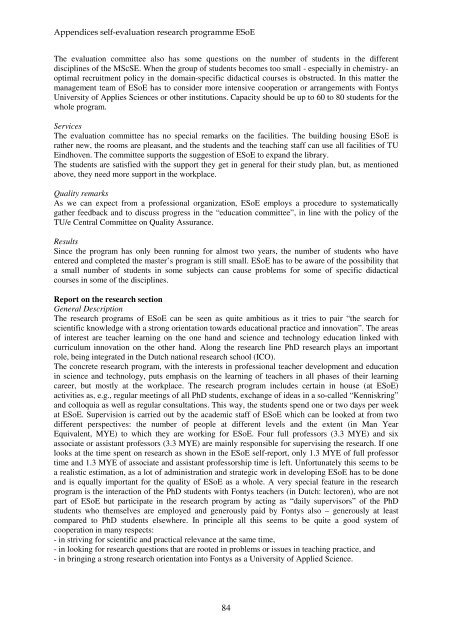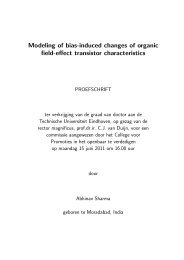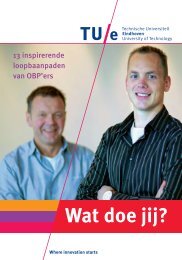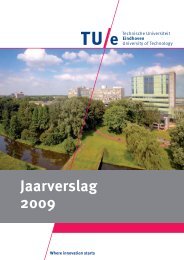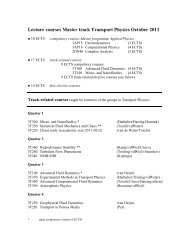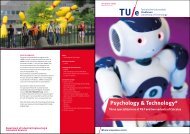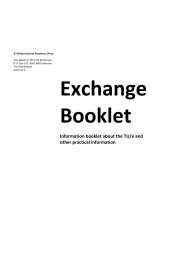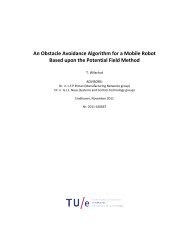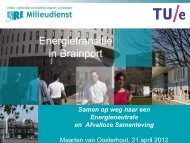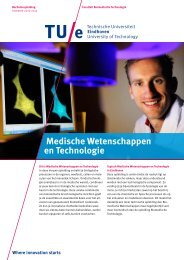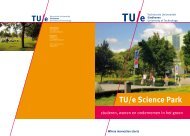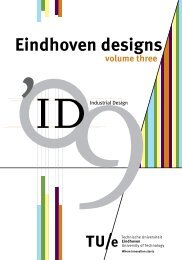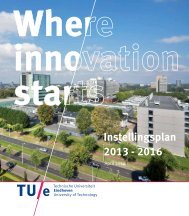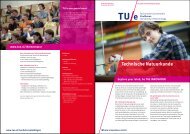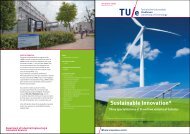Self-evaluation - Technische Universiteit Eindhoven
Self-evaluation - Technische Universiteit Eindhoven
Self-evaluation - Technische Universiteit Eindhoven
Create successful ePaper yourself
Turn your PDF publications into a flip-book with our unique Google optimized e-Paper software.
Appendices self-<strong>evaluation</strong> research programme ESoE<br />
The <strong>evaluation</strong> committee also has some questions on the number of students in the different<br />
disciplines of the MScSE. When the group of students becomes too small - especially in chemistry- an<br />
optimal recruitment policy in the domain-specific didactical courses is obstructed. In this matter the<br />
management team of ESoE has to consider more intensive cooperation or arrangements with Fontys<br />
University of Applies Sciences or other institutions. Capacity should be up to 60 to 80 students for the<br />
whole program.<br />
Services<br />
The <strong>evaluation</strong> committee has no special remarks on the facilities. The building housing ESoE is<br />
rather new, the rooms are pleasant, and the students and the teaching staff can use all facilities of TU<br />
<strong>Eindhoven</strong>. The committee supports the suggestion of ESoE to expand the library.<br />
The students are satisfied with the support they get in general for their study plan, but, as mentioned<br />
above, they need more support in the workplace.<br />
Quality remarks<br />
As we can expect from a professional organization, ESoE employs a procedure to systematically<br />
gather feedback and to discuss progress in the “education committee”, in line with the policy of the<br />
TU/e Central Committee on Quality Assurance.<br />
Results<br />
Since the program has only been running for almost two years, the number of students who have<br />
entered and completed the master’s program is still small. ESoE has to be aware of the possibility that<br />
a small number of students in some subjects can cause problems for some of specific didactical<br />
courses in some of the disciplines.<br />
Report on the research section<br />
General Description<br />
The research programs of ESoE can be seen as quite ambitious as it tries to pair “the search for<br />
scientific knowledge with a strong orientation towards educational practice and innovation”. The areas<br />
of interest are teacher learning on the one hand and science and technology education linked with<br />
curriculum innovation on the other hand. Along the research line PhD research plays an important<br />
role, being integrated in the Dutch national research school (ICO).<br />
The concrete research program, with the interests in professional teacher development and education<br />
in science and technology, puts emphasis on the learning of teachers in all phases of their learning<br />
career, but mostly at the workplace. The research program includes certain in house (at ESoE)<br />
activities as, e.g., regular meetings of all PhD students, exchange of ideas in a so-called “Kenniskring”<br />
and colloquia as well as regular consultations. This way, the students spend one or two days per week<br />
at ESoE. Supervision is carried out by the academic staff of ESoE which can be looked at from two<br />
different perspectives: the number of people at different levels and the extent (in Man Year<br />
Equivalent, MYE) to which they are working for ESoE. Four full professors (3.3 MYE) and six<br />
associate or assistant professors (3.3 MYE) are mainly responsible for supervising the research. If one<br />
looks at the time spent on research as shown in the ESoE self-report, only 1.3 MYE of full professor<br />
time and 1.3 MYE of associate and assistant professorship time is left. Unfortunately this seems to be<br />
a realistic estimation, as a lot of administration and strategic work in developing ESoE has to be done<br />
and is equally important for the quality of ESoE as a whole. A very special feature in the research<br />
program is the interaction of the PhD students with Fontys teachers (in Dutch: lectoren), who are not<br />
part of ESoE but participate in the research program by acting as “daily supervisors” of the PhD<br />
students who themselves are employed and generously paid by Fontys also – generously at least<br />
compared to PhD students elsewhere. In principle all this seems to be quite a good system of<br />
cooperation in many respects:<br />
- in striving for scientific and practical relevance at the same time,<br />
- in looking for research questions that are rooted in problems or issues in teaching practice, and<br />
- in bringing a strong research orientation into Fontys as a University of Applied Science.<br />
84


